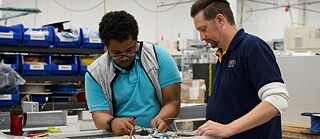Nachwuchssorgen in Handwerksbetrieben
German-Style Apprenticeships in the U.S.
Da es in Chicago oft an ausgebildeten Fachkräften mangelt, haben einige Firmen, die größtenteils in deutscher Hand sind, ein Ausbildungssystem eingeführt, das an das deutsche duale System angelehnt ist. Diese Idee wird nun auch von anderen amerikanischen Firmen übernommen.
Diese Folge anhören: Apple Music | Spotify | Download
Diese Folge stammt von Rhoda Metcalfe. Rhoda Metcalfe ist eine Radiojournalistin in Washington, D.C., deren Beiträge in Kanada, den Niederlanden und den USA gesendet wurden. In diesem Podcast unterhält sich Rhoda Metcalfe mit US-amerikanischen Firmen wie BBS Automation, The Diemasters oder Wittenstein North America, mit Auszubildenden des Industry Consortium for Advanced Technical Training (ICATT). Das Foto zur Folge hat Rhoda aufgenommen, es zeigt den Auszubildenden Jahi Taylor mit seinem Mentor Erik Smith.
Transkript
Old Publicity Video: American industry has met the challenge of war. American factories have achieved the impossible. American mass production is delivering the goods.
Rhoda Metcalfe: In World War II, America was a manufacturing heavyweight. When they turned their mighty industrial production towards the war effort, U.S. factories helped achieve victory for the Allies.
Old Publicity Video: United States engineers harness the skill, mobilize the resources of the most efficient manufacturing system in the world.
Rhoda Metcalfe: After the war, industry in Europe was in shambles. But America’s manufacturing sector — it was a powerhouse and the envy of the world. Throughout the ’50s and ’60s, a quarter of all working Americans were employed in industry. Manufacturing was humming.
[MACHINE NOISE]
Rhoda Metcalfe: This company — the Diemasters — came out of that era. The company began producing tools and parts in 1947, in Chicago’s vibrant industrial belt. And its machines are still producing parts today.
Paul Rimmington: So, this is our automated area ...
Rhoda Metcalfe: But these days, the Diemasters machines are much more sophisticated. There’s a lot of automation in the plant now, says Paul Rimmington. But it’s getting really hard to keep all these machines running.
Paul Rimmington: In the last two years, we’ve gone through five different maintenance people. Drug problems, skill isn’t what they should be. Another one, somebody hired him away.
Rhoda Metcalfe: Paul Rimmington bought this company almost 30 years ago. He and a partner ran it for 23 years, then six years ago they sold it. But Rimmington loves the company. So he stayed on to focus on the part he really enjoys — recruiting and training new workers. But he says when he tries to replace technicians — the employees who really know the machines and how the process works — he can’t fill those vacancies. It’s very worrying.
Paul Rimmington: You can’t find them. That skill is ... you can’t find it today. There’s not a company. Anybody in manufacturing needs maintenance people. It’s the most sought-after position today and the most unfilled skill.
Rhoda Metcalfe: And it’s not just maintenance technicians. There’s a whole raft of tradespeople — toolmakers and machinists, all the key skills that make manufacturing possible — they’re all in short supply in America. Rimmington says the U.S. education system doesn’t produce them. And what’s really troubling, he says, is that the few experienced technicians they do have are on the verge of retiring.
Paul Rimmington: Things go unfixed. We fix what absolutely has to be fixed. But things just don’t get done.
Rhoda Metcalfe: So you’re not operating at your maximum?
Paul Rimmington: No. It’s a bottleneck. It becomes a bottleneck. It’s very frustrating.
Rhoda Metcalfe: It’s a frustration being felt in manufacturing across the country. So here in Chicago, a handful of companies decided to turn to a German strategy to try to solve their workforce crisis.
Eric Smith: So, they all go through the same spiral wrap then. Yeah, they go through the same spiral wrap but they enter in different spots. So if you look over here ...
Rhoda Metcalfe: On the factory floor at BBS Automation, Eric Smith — the head of electrical design — is mentoring their newest apprentice. He’s showing him how to wire what’s called a disconnect box. They use them in all their automated machines.
[CONVERSATION GOING ON]
Rhoda Metcalfe: Now, apprenticeships have been around in the U.S. for decades. But this program — the one that Jahi Taylor is doing here at BBS — this is not your grandfather’s apprenticeship.
Jahi Taylor: From the start, they pay for all your classes, all your books. All your training that you get on site. So, it’s a literal debt-free way to get an education and find a career.
Rhoda Metcalfe: Jahi is even paid an hourly rate while he’s in training at the company. For him, that’s a huge deal. Because he’s got a big chunk of student debt to pay down. You see, Jahi started out going to college. He studied physics for two years, which he found he really did not like. Then he started into engineering. But the whole time, he says he was worried — his student debt was ratching up and he wasn’t sure what job all this studying was leading to. That’s when he heard about the program he’s doing now — what’s called the ICATT apprenticeships — and then he walked in here, onto the shop floor at BBS.
Jahi Taylor: What excited me when I came in is I saw all the machines that the company was working on. I saw a small machine that was just twining wires together. Then I saw a huge 20 station machine and I couldn’t even tell what it was making. But I was just like: oh my God, somebody built that. Like that was an idea that was in someone’s head and it became this! And if I work here, I get to be a part of that. I want to work here!
Rhoda Metcalfe: Jahi is a bright 23-year-old African-American kid from the other side of Chicago. He lives with his parents and has to drive an hour and a half to get here every day. But he doesn’t resent it, because Jahi really likes what he’s learning. He’s exactly the kind of candidate that high tech manufacturers are hoping to draw into this new apprenticeship program: an enthusiastic young person capable of working at both ends of the company.
Jahi Taylor: For example, today I’m working on a program called Solid Works ...
Rhoda Metcalfe: Jahi’s training requires him to spend part of his day on the office side of the building, working on the computer.
Jahi Taylor: So right now, this is a system that will supply oil to the rest of the machine. And what I’m doing is finding the parts we need, putting them into the design, and then making sure we have a proper count of them. So that when we go to order actual parts — when we build it in real time — we have enough parts, and we’re not scrambling back to order more.
Rhoda Metcalfe: In a few days, Jahi could be helping to put that same machine together back here on the factory floor. Jahi’s apprenticeship is based on the German system, which combines on-the-job training with a very rigorous curriculum of academics. Two days a week, he goes to a local community college, where he’s learning all the principles of modern manufacturing — pneumatics and electronics, also computer programming and design. A number of community colleges in the Chicago area have partnered with the ICATT program to give the apprentices a specially designed curriculum that’s closely based on the one apprentices learn in Germany. Jahi really likes the combination of work and study. He says for him, just straight college was too theoretical. He likes to use his mind, but he also likes to use his hands. And now he gets to do both.
Jahi Taylor: I’m working in the design aspect, which is even before we even begin the first step of building. I’m working alongside the builders actually building machines. I’ve been involved with every single piece of the process. And I’ve only been here seven months, eight months.
Rhoda Metcalfe: The official name of this apprenticeship program is the Industry Consortium for Advanced Technical Training — ICATT — and it got started three years ago. It was the brainchild of seven Chicago-area companies — all but one of them German-owned. Peter Riehle was at the center of it all.
Peter Riehle: We picked the German-style apprenticeship program because it’s the highest industry standard in the world. Not because we are a German company, but we know what we are getting into and how high the standards are — and the quality of education.
Rhoda Metcalfe: Peter Riehle moved to the States five years ago to head up Wittenstein North America. They manufacture high tech gearboxes and motion control systems that are used in the energy industry and aerospace, among others. Their headquarters are in Munich, Germany. And Riehle says over there, they’re constantly training up new young talent through the German apprenticeship system.
Peter Riehle: So far, in our HQ, we have 48 apprentices so far. They have a high tech environment, so really the best machines you can get for training these young students.
Rhoda Metcalfe: But he says in the U.S., most companies expect the education system to produce all these skilled workers. Companies are constantly hiring.
Peter Riehle: And you spend a lot of money for people helping you hiring good workers, aerospace engineers, application engineers. And then you have to onboard them, you have to train them. And we have a highly complicated product. We have specialized products for very harsh environments, extremely high quality standards. So our onboarding process, our training, and our investment in new people is extremely high.
Rhoda Metcalfe: It is a great time to be a high tech manufacturer, Riehle says. Here in the U.S., there’s a big market for their products and lots of room for growth. But he says it’s been difficult to grow their American production.
Peter Riehle: We have machines between 1 million and 1 and half million dollars. And we can run these machines only one shift. In one incidence we had a machine for over six months running only one shift.
Rhoda Metcalfe: Because why?
Peter Riehle: We had no machine operator.
Rhoda Metcalfe: And he says the young engineers they are able to hire, after many months of training — often as not, they’re snatched up by competitors who are equally desperate.
Peter Riehle: It’s a very competitive environment. We are surrounded by very good companies in the Chicago area and the Midwest — especially machine tool companies, high tech companies ... and everybody is growing. So good employees is the key.
Rhoda Metcalfe: I spoke with Peter Riehle at Chicago’s enormous downtown convention center. He had come here to attend a trade show. But not just any trade show: The International Manufacturing Technology Show. This trade show is held twice a year here in Chicago, and is the biggest of its kind in the country. In the giant showrooms, dozens of robotic arms whizz around, showing off their dexterity. Big ones bend and swing in the air like giant breakdancers. Smaller robotic arms show off their fine motor skills — assembling, then disassembling electric components faster than any human being possibly could. It’s all very impressive. And surrounded by all this shiny acrobatic machinery, its obvious how technologically advanced manufacturing has become. Which is why the U.S. so desperately needs a new generation of very skilled technicians just to stay in the game, says Peter Riehle.
Peter Riehle: The world of a machine operator has dramatically changed. These are more engineers, IT professionals. They have to understand scientific materials. They have to understand sensor technology — you have so much electronics data. And it’s accelerating. That’s what I mean by competitive in the U.S. You need these people, which understand that process. It’s much more than pressing buttons on a control and the machine does the job.
Rhoda Metcalfe: German manufacturers have had an influence in Chicago for many years. They first started setting up shop here in the ’60s. Now, there’s more than 350 German-owned manufacturing companies in this area. Most are small or medium-sized, many are family-owned.
They’re a kind of satellite community of Germany’s own manufacturing sector. Riehle explains that back in Germany, there are thousands of these small- to medium-sized manufacturers. In fact, they’re the backbone of the German economy. And they have been so successful that manufacturing in Germany still employs almost 20 percent of their workforce — the second highest rate in the world. In the U.S., only about ten percent of working Americans are now in manufacturing. Riehle says Germany’s companies have succeeded in part because almost all of them have developed a niche, a small number of products — often high-tech products — that they make better than anyone else in the world. But for that, he says, they needed very skilled workers.
Peter Riehle: And so they came together and started the whole system 60–70 years ago.
Rhoda Metcalfe: The apprenticeship system?
Peter Riehle: The apprenticeship system. And so they breed their own skilled labor and workforce.
Rhoda Metcalfe: Now, the hope is that this German model could produce similar results here in America’s northern industrial heartland. It’s had a promising start. Just three years in, the ICATT program has expanded from five apprentices in the first year, to 44 young people who are starting their apprenticeships this year. And on the company side, it’s grown from the original seven — mostly German — companies that got it started, to a total of 45 companies that have signed on to date. And half of those companies are American. It is an investment. Companies can expect to spend 30–50,000 dollars per year for each apprentice. The company that Jahi Taylor is training with — BBS Automation Chicago — is also German-owned company. Although in this Chicago operation, almost the entire workforce is American. And its president is an Irishman, Darragh Staunton.
Darragh Staunton: Well, I started — I left school at 14 and started as an apprentice in Ireland. So I know exactly what being an apprentice is and what that means.
Rhoda Metcalfe: But he sees there are challenges to growing this kind of intensive apprenticeship program in the U.S. He says a lot of manufacturers here are not convinced they need to invest that much money in their workforce.
Darragh Staunton: So I think employers: one, need to change about how they see it. That if you invest and educate your workforce, that can’t be a bad thing. You don’t go out to ... people have said — if you go to Walmart with a pickup truck and bring back employees and put them on the shop floor. It doesn’t work that way. The competitiveness this country has. The competitiveness that we have is not in me. It’s not in the building. It’s in the people putting it together, and that goes all the way down to the guys putting the stuff on the conveyors in an Amazon factory. If you get your box and it’s not the right thing, you’re not going to be a happy customer. And that’s the same here — if people don’t do the job they’re trained to do and the product is bad, we’re not going to be in business long. Companies, peers of mine have said: You’re crazy! It’s going to take three, four years before these guys are useful to you. The apprentices — within six months — are working on paid projects, so I have a completely different view to what they perceive it to be, because I’m actually doing it.
Rhoda Metcalfe: Part of the issue, he says, is that American and German companies generally take a very different view of planning and profits. In Germany, manufacturers invest in the long term — planning five, ten years down the road. Whereas in the U.S., Staunton says, American companies are often fixated on short term results and quarterly profits.
Darragh Staunton: I don’t know when that switch happened. Companies launching products. It’s quarter to quarter. That’s bad. Long term, that’s not a good thing to have. I mean, if you look at three month period in a business — its nothing. We here certainly don’t look at it from a quarter to quarter. It’s where are we going to be in five years, where are we going to be in 3 years. And I believe that anyone running a company have an obligation to make sure that entity lives for three, four, five, six ... ten years. And you can only do by building a proper foundation.
Rhoda Metcalfe: And then there’s the kids. Staunton says in Germany and many other European countries, young people jump at the chance of apprenticing in a modern manufacturing company.
But in the U.S., he says, a lot of the companies that have joined the ICATT program have had a hard time finding good candidates to apprentice for them. He says most American kids are convinced they have to get a four year college degree to succeed in life.
Darragh Staunton: If you don’t go to college to be a doctor or optician, you’re not somebody. And a car mechanic is a dirty job. Or putting windows into a building is a bad job. And our industry in particular, people think it’s not a nice job. It’s far from that. It’s a very interesting and rewarding job. But it’s not valued.
Rhoda Metcalfe: In fact, to make the ICATT apprenticeships more appealing to Americans, the organizers worked with the community colleges involved. So that by the end of the program, the apprentices will have a two year associates degree — something that the German system doesn’t do. But Staunton says parents still take a lot of persuading. Many of them hate the idea that their kids will go off and work in a factory. But then, a lot of Americans still think of manufacturing the way it was in the ’60s, with the assembly lines. Noisy and dirty. Dusty and dank. In the 1980s, U.S. companies started outsourcing a lot of this manufacturing — setting up their factories in Latin America and Asia, where labor is cheap and not so choosy. While back in the States, young people were increasingly disdainful of any job that smacked of blue collar, and college seemed the only way to go. But today’s modern high tech factory is a completely different creature. Inside BBS Automation’s plant, for example, the walls are white. There is a constant shushing sound from the pneumatic machinery, but it’s not hard on the ears. The ceilings are high and airy. It’s bright. And they keep it very clean, says Eric Smith, the head of electrical design.
Eric Smith: As long as we can keep our environment clean it’s more attractive to customers. It makes it easier to build machinery, because you’re not contaminating things.
Rhoda Metcalfe: In many ways, this BBS plant shows just how far manufacturing has come. Inside the plant, you see dozens of huge white boxes. Inside each box is a different robotic machine, designed and built here in the company. Some are quite simple, others very complex. BBS is a custom automation builder. What that means, Smith says, is that clients come to them with products that — up to that point — have been made by hand.
Eric Smith: So that’s the big challenge for us — is that, you know, if you’ve been assembling something by hand for so long ... and now you want to automate the process. How do you mimic a human being putting something together with a robot or automated equipment?
Rhoda Metcalfe: Robotics and automation — this is the core of modern manufacturing now.
It’s fascinating stuff. But getting kids interested in making this a career — that’s still a challenge. Although schools in the Chicago area are certainly trying.
[CLASSROOM NOISES]
Rhoda Metcalfe: Back downtown, herds of children have been bussed in to the International Manufacturing Technology Show. They’re set loose to explore the wonders of robots and state-of-the-art industry.
Frank LaMantia: I wish this show was every year. Wish it was three times a year, because you see all the enthusiasm of the kids here. And they went as low as middle school and elementary, to get these kids interested in this now.
Rhoda Metcalfe: Frank LaMantia works in career development with four local high schools. He’s been trying to interest more kids in manufacturing, because there’s so much opportunity there, he says. And so many well-paid jobs. But he says schools have had to rebrand their programs just to make them more appealing.
Frank LaMantia: A lot of the manufacturing programs are changing their title to ‘engineering technology.’ Why? Because you say manufacturing to a parent ... oh no no no, my kids going to do more than that. Because they see it as a dead end, low skill, low wage job. You say engineering technology — and all of a sudden their ears perk up because oh yeah, every parent wants their son or daughter to be an engineer.
Rhoda Metcalfe: And in truth, it is complicated for companies to find the right young candidates for this line of work, because it’s a field that straddles the line between trades and academics. It’s easy to find kids here at the convention who love math and sciences and technology — but a lot of them think like 15-year-old Even Benjamin.
Even Benjamin: I’ll probably also do like just the four years of college, just because I want to be like an engineer. And it’s just that I want the four years of engineering.
Rhoda Metcalfe: And then — at the other end — there are kids like these four teenagers from Pike County, Illinois.
Rhoda Metcalfe: Are you interested in getting work in the manufacturing sector?
Blake Palmer: 100 percent yeah. I’m really looking forward to it.
Rhoda Metcalfe: Blake Palmer, a curly haired 16-year-old has taken school courses in welding and machining and he loves it.
Blake Palmer: Yeah, welding’s fun. Me and him — we took a small course our sophomore year. And then we heard about machining and how they need more jobs. It’s really fun. Except the tap drill stuff. The decimals they have to do. Like from one fourth equals.
Rhoda Metcalfe: You know for the good jobs, you have to have a pretty decent level of math.
Blake Palmer: Yeah. I’m horrible at math, so it’s hard. I’m bad.
Rhoda Metcalfe: And there is the dilemma: Kids who are attracted to the trades, often shy away from math and sciences. And the kids who can handle the math and science usually think college is the only way to go. And to be fair, very few kids have any idea that there is a middle path in manufacturing, where you can combine working with your head and working with your hands — and make a very good salary along the way. But now, at least, there are a few young ambassadors showing the way. Five of them are — at this very moment — three stories above the trade show, about to graduate. It’s the ICATT apprenticeships very first graduation.
Voice: Darnell Kaiser ...
Rhoda Metcalfe: The five young apprentices walk across a blue-lit stage to receive their diplomas.
In fact, they’re receiving three things — the two year college degree, their journeyman papers as newly minted tradespeople. And one last thing that very few people in America have ever earned — a German Industrial certification. On stage, the head of the ICATT program, Mario Kratsch, explains that this certification will allow these apprentices to work all over the world.
Mario Kratsch: In right now is it 45 or 35 countries? 35 — 35 countries. So just think about that— the certificate you will get is valid in 35 countries.
Rhoda Metcalfe: Although none of them will be travelling right away. As part of the program, these graduates have all agreed to work their first two years with the companies that trained them.
After the ceremony, Andrew Splett — who’s one of the graduates — says he’s really hoping to work with his company, Hermann Ultrasonics, for many years to come.
Andrew Splett: I have no reason to leave. They trained me extremely well over there. I think of everyone over at Hermann as my second family, pretty much. So it’s a pretty good gig, honestly. I don’t see myself leaving for a very long time.
Rhoda Metcalfe: And there it is: The company loyalty that all of these manufacturers are trying to engender through this apprenticeship program. By investing in these young people and mentoring them every day, the company leaders hope they won’t be lured away by competitors. It’s a relationship that Andrew seems really happy with. And the work — well, he’s developed a real passion for it. His company specializes in using ultrasonic technology to weld plastics together.
Andrew Splett: Oh yeah, I find it insanely interesting. Everything about it. There’s so much unknown about the technology, as well. When you start diving into it and really getting deep down, it’s like the roots of why it’s happening — and you start really talking about the science and math behind it, its just fascinating.
Rhoda Metcalfe: Both Andrew and his mother, Kathy Splett, have become big advocates for this apprenticeship program. His mom says she talks to other parents about it all the time.
Kathy Splett: Any time a mom is saying their son or daughter is unsure of what they want to do and they like the engineering classes, we always say: You should try this ICATT program. It’s a win-win. No debt. And that Andy was also impressed that — Mom, I’ve got a job for two years after I graduate. It’s in the contract. And that was a relief off his shoulders, thinking — how am I going to find a job. Everybody’s looking for jobs. So I loved it.
Rhoda Metcalfe: And she says she was also surprised at what a wide range of experiences her son got during his training. She thought he was just going to learn how to run machines.
Kathy Splett: Hermann’s has allowed him to go to each different department to find his fit, instead of staying behind a machine all day. He helped with marketing, he helped a little bit of sales to see where he would be well-suited. So that was very interesting to me, that they looked at getting a more well-rounded person than just working on machines all day.
Rhoda Metcalfe: And that’s part of the philosophy of the German apprenticeship system, explains Peter Riehle, the president of Wittenstein. In fact, he says, an apprenticeship in Germany is considered just as valuable as going to college.
Peter Riehle: Here in U.S., if you are not graduated from college, it’s ... you have not so many choices — is the stereotype. Germany is completely different. You can go to college, but you can also be graduating as an apprentice and make the same career. You can become a manager in a company, you can become a CEO, a CFO, whatever. There’s no limit. You’re not put in that corner and told you didn’t graduate from university, so you cannot do that job. Many, many company leaders — and I know many of them — they started as apprentices and now they own the company. They are the owners and the CEOs.
Rhoda Metcalfe: And he hopes it will work the same way here. Because these ICATT apprenticeships, he says, are meant to be the beginning of a career with a company, not just a job. And that idea is slowly spreading. That first company we visited — the Diemasters — they’ve joined the ICATT program now, too, and they just got their first apprentice. His name’s Oscar. He’s not here right now. He’s doing his classwork at the local community college. Paul Rimmington is very excited about the program. He says after years of searching and not finding the people they need, now he feels hopeful for his company’s future.
Paul Rimmington: That’s why this is so exciting. You bring a young person in. They have so much energy, it just ... it infects people!
Rhoda Metcalfe: In fact, Rimmington’s feeling a creeping optimism about the future of American manufacturing in general. He meets a lot of students around Chicago, at events like career days and robotic championships.
Paul Rimmington: Kids are now working on robots, drones. These kids are learning the same kind of skills that we need in the manufacturing, so these kind of young people are now beginning to see that this is an alternative. It hasn’t switched yet. We’re not past the tipping point, but we’re seeing a big change.
Rhoda Metcalfe: And the parents, too, he says, are beginning to be more open to the idea of sending their kids into manufacturing.
Paul Rimmington: Instead of their young person going to school for four years and say: Now, what am I doing? Living in the basement? And their alternative is — no offense to Starbucks — being a barista, versus if you look at our plant — or look at many of the people that are part of this advanced manufacturing. It is not dirty, dark, and dank. It’s absolutely snazzy. So I think this whole advanced manufacturing idea is beginning to catch on.
Rhoda Metcalfe: And he says the ICATT apprenticeships are showing how well it can be done. Drawing on the German model, in which companies take on the role of educators — investing in young people, mentoring them, and compensating them for their training. So that young people emerge from an apprenticeship highly skilled and excited to be part of the industry. And also feeling a deep current of loyalty to the company that gave them the opportunity. Rimmington says it’s time for his company to try this new approach. He can’t wait to see the results.
In Chicago, I’m Rhoda Metcalfe.







